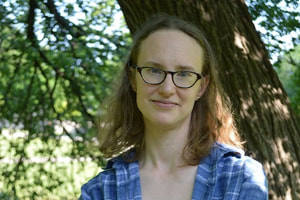T.D. Walker
from ANC062: Maps of a Hollowed World
The Undertaker's Vision of Burial as an Act of Luthiery
|
Each of us has our own
approach to lay the dead’s right distal phalanges into the mass graves some call our mausoleum, others our necropolis. The first of us arranged the bones as if they sought the Earth they came from. But everything moves: each undertaker given the single bone we keep from the dead before we reuse the body as we must. Some engraved each life in dates the Earth gave us, some in time as we mark it now, out of reach of a homeland we’ve let rest except for light, for the sound waves space cannot bring us directly. I cataloged them all: each undertaker’s method. One arranged by date, others by cause of death or cause that directed the life that held the bone within. I have begun to shape an instrument: the bones not harp pins nor the pegs of violins, but something to tune the pitch the ship must make when we pass our final way-point. Who will hear this instrument keen out, tell of a world that drowns us in our past? We push ourselves forward, this barrow testament to each step forward, to a river we can choose to drown the stories of a past we are still crafting. |
Father’s ships, come to land: take my
hand, take my middle. Ships sailing in: my life. O Sister, I swear I’ll never be his violin, his harp. I’ll be no man’s wife. The youngest stood upon a stone, and you couldn’t see her. You couldn’t see her fingers, her middle. She swam, a mermaid, a swan. Farewell, the first tune. Without life he courted her. She threw in gold and pearls, land: what may not be so great, so rare. The tune sank. He played her sister dear the treble string, courted with glove and ring, with grief and spite: the youngest you couldn’t see maiden for evermore. She swam to our father’s ships, the fair hand loved above all things. |
Phrases in the right column are from Versions A and B of “The Twa Sisters,” English and Scottish Popular Ballads, Helen Child Sargent and George Lyman Kittredge, eds.
|
|


